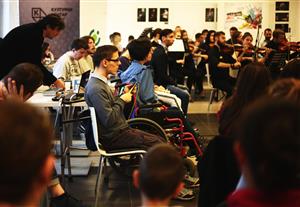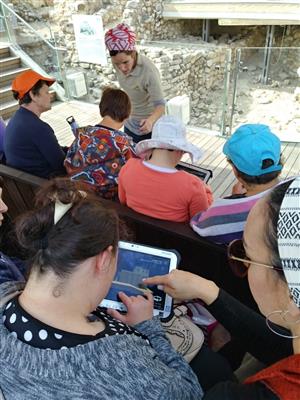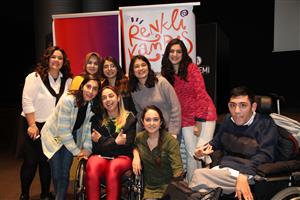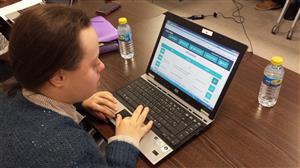Search Results
Search
Filter results
Advanced Filters
Your search returned 279 Solutions
-
University organizing courses for multidisciplinary teams to build accessible homes
The Mahasarakham University in Bangkok developed Home For Life, a three-day training workshop for civil servants, urban developers, and public health practitioners focused on creating accessible indoor and outdoor built environments, especially for persons with physical disabilities.
MSU-DU - Mahasarakham University, Universal Design Center, Home For Life, Thailand -

Music workshops and an orchestra for youth with disabilities
The Music Workshop’ is a project operating within Milan Petrović, a boarding school and day-care centre for youth with disabilities in Novi Sad, Serbia. Using innovative assistive technologies, participants learn to create and interpret music. In 2016 the workshops led to the creation the Good People Orchestra.
Primary and Secondary Boarding School Milan Petrovic, Novi Sad, Serbia, An accessible music programme, Serbia -
Assistive technologies and teacher training in mainstream schools
The "Active Inclusion" project introduces assistive technologies and learning possibilities into primary schools and carries out networking and lobbying activities. Also the programme offers trainings for teachers from participating schools as well as educational software programmes for children with disabilities.
Open The Windows, North Macedonia -

Museum accessibility for visitors with intellectual disability
The project aims to increase knowledge of those working in museums about accessibilities for people with intellectual or developmental disabilities. Training and support are provided in order to adapt or create accessible installations. Since the initial phase ended, AKIM has continued to train staff in other leisure organizations.
AKIM Israel - The National Organization for People with Intellectual Disabilities and their Families, Making museums and sites of leisure cognitively accessible, Israel -

Training students to become leaders and innovators in accessibility and inclusion
Degistiren Adimlar Dernegi (DADER), Turkey: Runs Campus of Colours, a programme for high school and university students to develop socially responsible leaders. From 2015 to 2023, involved students, 35% with disabilities, with projects winning awards.
Campus of Colours, Turkey -

Making e-mail communication accessible for persons with intellectual disabilities
Kolumba is an open source software that makes a Gmail account more accessible to persons with intellectual disabilities. Kolumba has three features that can be switched on and off on when needed: A Text and content simplifier (Simplext), a translation tool fort ext and pictrogram (Text2Picto) and a Text-to-speech feature.
Prodis Foundation, Kolumba software, Spain -
Disability-led centres providing a range of services for independent living
FOH centres are run entirely by people with disabilities and aims to offer comprehensive services for such people in their home and throughout their daily lives. In 2017, 47 homes were adapted, 223 people were provided with transport, 120 people took part in sport or the arts, and 2,435 assistive devices were provided.
Forum of the Handicapped, Lebanon -
The London 2012 Olympic and Paralympic Games were held for the first time as one event. LOCOG’s Accessibility Policy inculcated accessibility into everything done. For the first time people with disabilities were able to participate in every single aspect of the Games, both as spectators, as employees and as volunteers.
London Organising Committee of the Olympic and Paralympic Games, United Kingdom -
The Home from Home Apartment offers fully accessible accommodation with aids and appliances to persons with physical and sensory disabilities and their families. It offers independent living in a non-clinical setting for short breaks and general health appointments in Dublin.
Home from Home is a non-clinical setting offering persons with disabilities and their families the chance to stay overnight without having to stay at the hospital. The apartment was designed by persons with disabilities. It offers ceiling track hoists in the bedrooms and provides a fully equipped kitchen and a lounge area.
Muscular Dystrophy UK, Changing Places Consortium, Staying away from home in a non-clinical setting, Ireland -
Inclusive Education
rolled out throughout Ghana
Ghana's inclusive education policy and a comprehensive implementation plan (2015 to 2019) have led to the nationwide introduction of inclusive education. The programme started in 2009, by 2011 a total of 529 schools were participating and 1,322 teachers and specialists from the Ghanaian Education Service were trained.
Ghana Education Service, Special Education Division, Inclusive Education Policy, Ghana